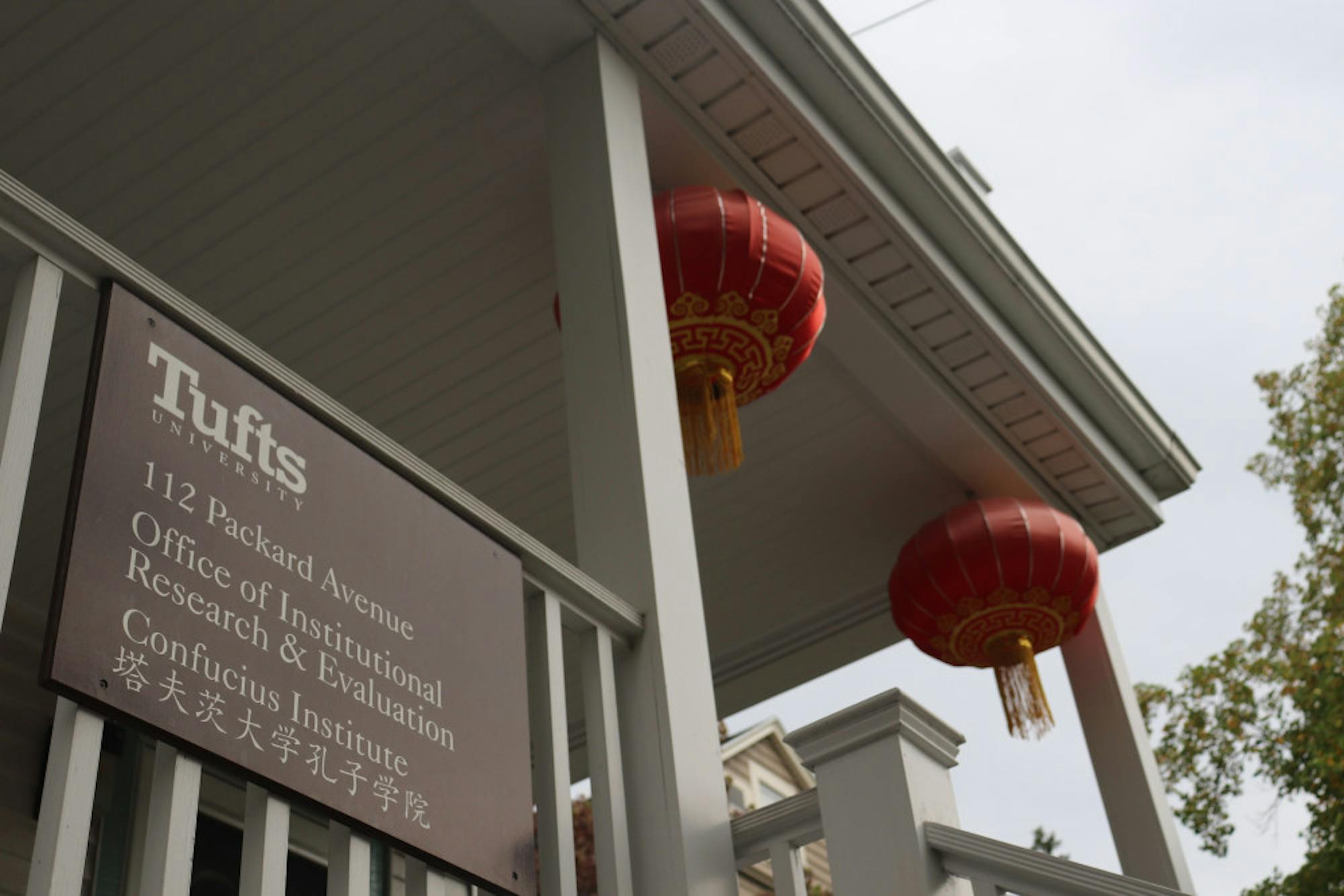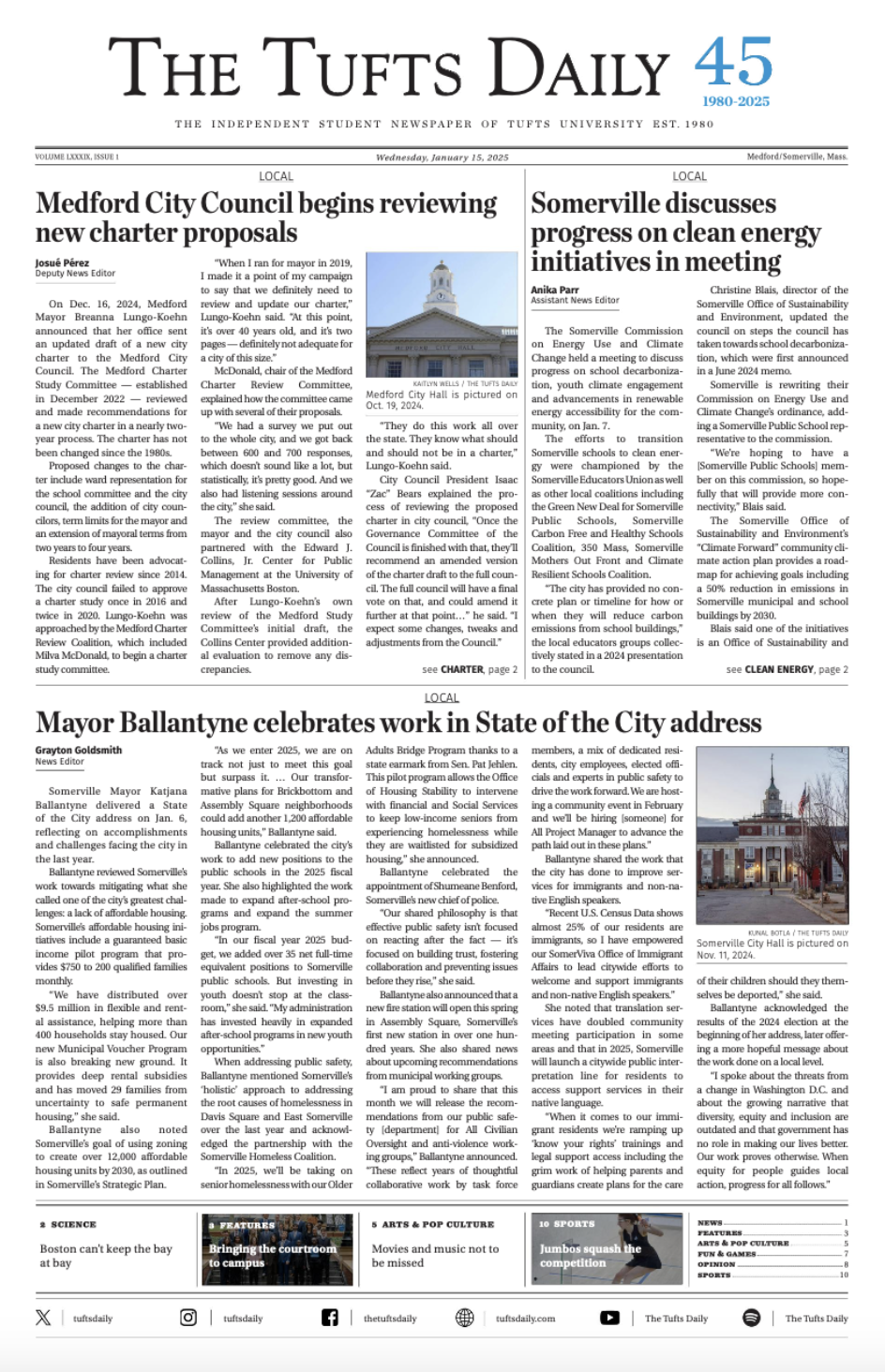Tufts renewed its contract with the Confucius Institute, a Chinese government-funded language and cultural education center, until 2021, after a semester-long review process that was triggered by concerns over Chinese Communist Party (CCP) influence and suppression of academic freedom.
The review committee’s report, published Tuesday, found that while Confucius Institute instructors avoided sensitive political topics, there is no evidence of CCP propaganda being disseminated through the institute’s language instruction or cultural activities.
The review committee reached this decision by interviewing students and faculty, conducting outside research and analyzing Confucius Institute instruction materials.
The report also highlighted the benefits that the Institute provides in terms of language acquisition, cultural exposure and facilitation of foreign exchanges with Tufts in Beijing’s partner institution Beijing Normal University.
However, the review committee did find that the Confucius Institute presented serious “reputational and ethical concerns” for the university which led to a series of amendments to the new contract intended to safeguard academic freedom, tighten Tufts’ management of the institute and improve transparency.
In a statement, University President Anthony Monaco said that his administration had worked to balance the concerns of those who opposed contract renewal with the benefits the Institute provides.
“We think the enhanced oversight and controls we’ve adopted will ensure that the Confucius Institute at Tufts University will continue to operate in the spirit of academic freedom that we cherish and promote,” he said.
Mingquan Wang, a senior lecturer of Chinese and director of the Confucius Institute, said in an email that he was pleased that students will continue to profit from his center’s programming and added that the contract changes would help make sure the institute complies with all of Tufts’ policies.
The new contract with Hanban, the department of the Chinese Ministry of Education responsible for funding Confucius Institutes, was signed by Provost and Senior Vice President Nadine Aubry on Sept. 16, and does indeed include substantial changes.
The contract runs 24 pages, up by seven from the initial 2014 contract, and states four different times that the Confucius Institute must follow all of Tufts’ policies and uphold academic freedom and freedom of expression, where the old contract made no mention of it.
The new contract also drastically lowers the threshold for the university to terminate the agreement by shortening the duration of the contract from five years to two years and allowing termination with or without cause after 60-day notice and immediate rupture if the “image and reputation” of the university are negatively affected by its association with the Institute. The previous agreement required a six-month notice to terminate the agreement.
The review committee report also advised that the university form a “program committee” exclusively appointed by the dean of Academic Affairs for Arts and Sciences that will have review power over the Institute’s curriculum, budget and staffing.
In another change that could be crucial, the new contract also states that Tufts has “exclusive management control” over the Confucius Institute.
Bonnie Glaser, the director of the China Power project at the Center for Strategic and International Studies, a foreign policy think tank, told the Daily that if the university does exercise total control over the Institute in practice, it would be a game-changer.
“If Tufts is calling all the shots and can defend all of its interests, then perhaps Tufts has changed this template … that the Chinese have used in the past,” she said. “That would show some flexibility in the Chinese side in order to sustain these Confucius Institutes — that they’re willing to make compromises.”
This potential shift comes after years of controversy over Confucius Institutes, according to Glaser.
“These Confucius Institutes, in the beginning, were seen as fairly innocuous, but over time they have raised more concerns,” she said.
Glaser says that there is evidence that institutes are one relatively minor part in the global influence campaign China has been waging to positively influence its perception abroad.
“They are ways of spreading China’s narrative about itself under the guise of culture and language,” she said.
However, she said that every program is different and that she did not know if this applied specifically to Tufts’ program.
The U.S. Senate Permanent Subcommittee on Investigations released a scathing report on the Institutes in February calling them tools of Chinese soft power and influence, while the 2018 Defense Authorization Act barred any university hosting a Confucius Institute from receiving Department of Defense funding for language instruction.
Meanwhile, the lawmakers, including Marco Rubio (R-Fla.),Ted Cruz (R-Texas) and Josh Hawley (R-Mo.) have been sending letters to individual universities demanding they close their programs.
Amid this surge of criticism, 27 universities across the country have closed their programs for various reasons.
Tufts’ own review was prompted by a May 2018 letter to Monaco from Congressman Seth Moulton (D-Mass.) that called on him to close the Institute.
In an exclusive statement emailed to the Daily, Moulton was sharply critical of the contract renewal.
“Tufts’ decision is troubling at best, deeply naive at worst, and the school must exercise extreme scrutiny over the terms and conduct of the Confucius Institute over the next two years,” Moulton said.
Moulton called on Tufts to not only review its decision, but its entire process for assessing organizations like Confucius Institutes.
“I strongly encourage Tufts to reconsider their decision, and I also encourage the university to adopt rigorous processes to review the risks inherent to international projects with countries and entities that threaten academic freedom," he said.
Moulton pointed to statements by the CCP that called the network of institutes key to their global influence strategy and said that Confucius Institutes run counter to American values of freedom of scholarship and intellectual exploration.
Diana Chigas, senior international officer and associate provost, who chaired the review committee, said that there was a wide discrepancy in opinion between external critics of the institute, like Moulton, and students with personal experience with the Confucius Institute’s programming.
“Members of our community who have worked closely with the Confucius Institute at Tufts University told us they had not encountered the kinds of concerns that critics have raised about Institutes elsewhere,” she said in a statement.
Instead, Chigas said that students who have participated in the Institute’s programs recounted the improvements they made in their Mandarin skills or cultural events the center organized like the Moon Cake celebration.
Haitong Du is one of those students. An international student from China, Du came to the Confucius Institute looking for a community space and attends cultural activities sponsored by the center. He said he’s seen no signs of CCP propaganda.
“In zero circumstances have I seen or heard the Confucius Institute or affiliates of the Confucius Institute promote anything remotely political. It’s purely culture,” he said.
He criticized outsiders who have never been to Tufts for trying to deny access to Chinese language instruction to the university community based on their own beliefs about international politics.
Gao Qing, executive director of the Confucius Institute U.S. Center, which provides support to institutions based in the United States, heralded the decision to renew the contract as an encouraging sign for centers and described the programing they provide as “vitally important” in today’s globalized world.
He panned criticisms like Moulton’s as “baseless allegations” and advocated for other universities to follow Tufts and conduct reviews that he believes would disprove the claims against them.
“A lot of the criticism comes from misconceptions and misinformation about what the program is and also a lot of the allegations simply come from the close-minded [people] that don’t see the necessity of global connections and prefer isolation,” he said.
Not everyone is as content with the decision.
Lhadon Tethong, director of the Tibet Action Institute, who extensively lobbied Tufts and Monaco to close the center in 2018, said that she was disappointed with Tufts’ decision and derided the contract changes that the university made as cosmetic.
“The idea that you can control or micromanage their behavior through tweaking the contract or making some structural adjustment to the program I think is … ultimately beside the point,” she said. “It’s textbook to win hearts and minds through these language initiatives and like dumpling nights.”
The soft power of Confucius Institutes is subtle, she said, fostering love for the Chinese language and a CCP-endorsed version of Chinese culture so that students begin to separate those aspects of the country from its repression in Tibet and Hong Kong and against Muslims. Tethong sees this distinction as impossible and dangerous.
Tufts is no stranger to criticism for its ties with foreign governments. A Tufts Daily investigation last year revealed that the university has received almost $60 million from Saudi Arabia, and that President Monaco met with Saudi Crown PrinceMohammed bin Salman in 2018.
In contrast, the response to the Confucius Institute controversy has been much more robust, with the university releasing the review committee’s extensive report and pledging that it will make future Confucius Institute contracts and budgets publicly available.
The review committee report revealed that Tufts has received $409,810 from China to run the center since 2015, even though it was not required to do so by law.
Robert Kaplan contributed reporting to this article.
Finding no undue Chinese influence, Tufts renews contract with Confucius Institute

Tufts renewed the contract for the Confucius Institute on Sept. 16, 2019 following a lengthy review process.





